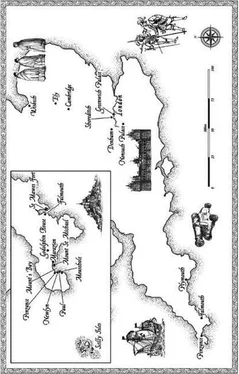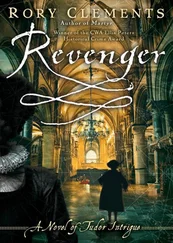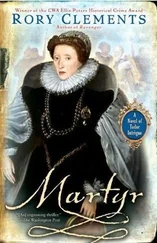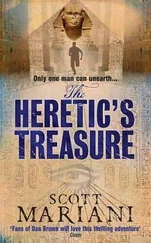Rory Clements - The Heretics
Здесь есть возможность читать онлайн «Rory Clements - The Heretics» весь текст электронной книги совершенно бесплатно (целиком полную версию без сокращений). В некоторых случаях можно слушать аудио, скачать через торрент в формате fb2 и присутствует краткое содержание. Год выпуска: 2013, Издательство: John Murray, Жанр: Исторический детектив, на английском языке. Описание произведения, (предисловие) а так же отзывы посетителей доступны на портале библиотеки ЛибКат.
- Название:The Heretics
- Автор:
- Издательство:John Murray
- Жанр:
- Год:2013
- ISBN:нет данных
- Рейтинг книги:3 / 5. Голосов: 1
-
Избранное:Добавить в избранное
- Отзывы:
-
Ваша оценка:
- 60
- 1
- 2
- 3
- 4
- 5
The Heretics: краткое содержание, описание и аннотация
Предлагаем к чтению аннотацию, описание, краткое содержание или предисловие (зависит от того, что написал сам автор книги «The Heretics»). Если вы не нашли необходимую информацию о книге — напишите в комментариях, мы постараемся отыскать её.
The Heretics — читать онлайн бесплатно полную книгу (весь текст) целиком
Ниже представлен текст книги, разбитый по страницам. Система сохранения места последней прочитанной страницы, позволяет с удобством читать онлайн бесплатно книгу «The Heretics», без необходимости каждый раз заново искать на чём Вы остановились. Поставьте закладку, и сможете в любой момент перейти на страницу, на которой закончили чтение.
Интервал:
Закладка:
Robert Southwell crossed himself. ‘You know that is not so, Mr Shakespeare.’
It was true. They were not enemies. And while Shakespeare could never comprehend Southwell’s quest for death, nor like the way he held to the superstitions of Rome, he admired his courage, his piety and his poetry. If it was true, as the English state insisted, that some Jesuits contrived the death of princes, then Southwell was not one of them. Either way, though, he was about to have his martyrdom.
Shakespeare nodded slowly. This man had once risked life and liberty to help him; he could not refuse him now. ‘I will do what I can, Father. You had better tell me every detail you know.’
Just over a mile north-east of Newgate, near Bishopsgate, Garrick Loake sat alone in an alehouse booth. He had downed four pints of strong beer and was beginning to feel hazy. Yet he was not drunk, not enough to ignore the uncomfortable feeling that his meeting with John Shakespeare had gone badly. Would it go any better on the morrow? A fresh tankard was slopped down in front of him. He paid the maid a penny, then picked up the vessel and drank deeply.
The problem was there was no going back now. He had told Shakespeare too much to shirk their next meeting, and so he would be at his house in the morning. What about tonight, though? He couldn’t go home; it wasn’t safe there. Not now. He looked around at the other drinkers in the taproom. Every man seemed a threat.
He fished out his purse and saw that his hand was shaking. Counting the meagre contents, he gauged that if he drank no more, there might just be enough for a room for the night at one of the cheaper inns. And he would say a prayer that Mr Shakespeare would save his skin.
Chapter 3
It was almost eleven o’clock when Shakespeare reined in at the brick-built gatehouse facing the green on the north side of Richmond Palace. In the distance, way beyond the outer wall, lights flickered behind a multitude of windows in the fourteen towers of the royal lodgings, clustered around the inner quad. Shakespeare patted the horse’s neck. It had been a hard ride from Newgate along eleven miles of treacherous roads.
A squad of six halberdiers approached and barred his way. He showed them his papers and one of them disappeared beneath the archway into the echoing spaces of the outer courtyard.
Soon, an elegant, white-bearded man appeared, attired in black except for a crisp white falling band about his neck, and carrying a lantern. Shakespeare nodded in recognition; it was Clarkson, most trusted retainer to Sir Robert Cecil.
‘Mr Shakespeare, sir, you are expected straightway.’
Clarkson held the lantern forward and studied the newcomer’s mud-and-sweat-stained fur cloak, hesitating, as though worried that such poor clothes would not be acceptable in the royal chambers. Finally he dismissed his concerns. ‘Please dismount and follow me. The guard will take your horse to the stables.’
Cecil, who was waiting in his apartments, did not bother with pleasantries. ‘Well, John, what did Mr Southwell have to say for himself?’ His voice was brisk and businesslike. ‘I take it he did not offer to recant and plead for his life?’
‘No, he desires martyrdom.’
‘Then we shall not disappoint him. Will he make a good death?’
‘I believe he will. He shows no fear.’
Cecil seemed disappointed. ‘Why did he wish to see you?’
‘He asked me to tell Her Majesty that he is, and always has been, a loyal subject.’
Cecil emitted a dry laugh. ‘Yet like all his order he condemns her as a heretic. And we well know what the Inquisition does to those they accuse of heresy. Anyway, how can we believe a single word he says, now we know of this Jesuit policy of equivocation? He might be saying out loud, “I am loyal to the Queen,” while in his heart are the words, “ though my first loyalty is to the Pope and King Philip, and therefore I will conspire to kill her ”.’ Cecil almost spat the words. ‘Is that all he said?’
‘No. He wants me to find a girl. She is on his conscience. I think he fears he will not be saved if I do not do this.’
‘What girl? I had thought him Christ’s fellow.’
‘Thomasyn Jade, one of those ill used by the exorcists back in the year of eighty-six.’
‘Who is she?’
‘I know nothing more than her name — and that she was brought to a house in Buckinghamshire to be exorcised by Weston in the few days that he was with Southwell. When Weston and others were arrested, she was taken by pursuivants. By then she was insane, which is why Southwell feels such guilt. He fears their rites helped destroy her mind. Lady Susan Bertie, the Countess of Kent, took the poor girl under her wing, but then she vanished.’
‘God’s wounds, Southwell and his like will have much to answer for at the day of judgment.’
Shakespeare did not point out that it was Southwell who had brought the girl’s torments to a halt. He was aware that Cecil did not wish to hear a good word said about his condemned Jesuit cousin — not this night. Tonight Cecil had a heavy conscience of his own to contend with.
Southwell had become a forgotten man during his thirty months of isolation in the Tower and Gatehouse prisons, and he might have seen out his days in squalid obscurity, had he not drawn attention to himself by writing to Cecil’s father, Lord Burghley, begging either to be allowed visits from friends or, failing that, to be brought to trial to answer charges. Old Burghley’s response had been brutal and terse: if Southwell is in such haste to be hanged, he shall quickly have his desire.
It had been an uncharacteristically impatient and ill-judged response, but perhaps the Lord Treasurer’s chronic gout had been the true irritant. Once the decision had been made, however, the younger Cecil had no choice but to issue the order for Southwell to be transferred from the Tower to Newgate to meet his fate.
The trial in the court of Queen’s Bench, before Chief Justice Sir John Popham, had been swift and vicious. Attorney-General Edward Coke had led the prosecution, but it was the torturer Richard Topcliffe whose voice had been loudest. His ranting and raving had been such that Popham had had to silence him.
The worst part was the unexpected arrival of the one witness for the prosecution: Anne Bellamy, a young woman whom Southwell had once called friend and whose betrayal had led to his arrest. Now she was married to Topcliffe’s young apprentice, Nicholas Jones. As she stepped up to the witness stand and testified how she had been taught to equivocate — to lie — by Southwell, he hung his head, crushed. How, shouted Topcliffe, could any man or woman believe a word a priest said if he spread a doctrine of deliberate falsehood? The jury took fifteen minutes to find him guilty and sentence was pronounced.
Shakespeare knew, however, that the Queen and her Council were rattled. A week ago, Father Southwell had languished unremarked in his Tower cell. Now his name was on everyone’s lips and the whole of London would be there to see him brought to his doom. It would be a huge spectacle and one that would not show the Queen or her government in a good light.
‘Well, John, what was your reply to the Jesuit’s request?’
‘I said I would seek her, Sir Robert.’
‘Did you so?’
Cecil stretched his aching neck. He was a man of small stature, with a slight hunch to his shoulder that he tried in vain to disguise by altering his posture. These days, he was increasingly exhausted by the burdens of state. His bed called out to him, but as long as the Queen was awake, so must he be.
‘And do you think you have the time for such trifles? Do you not think we have rather more important matters to contend with?’
Читать дальшеИнтервал:
Закладка:
Похожие книги на «The Heretics»
Представляем Вашему вниманию похожие книги на «The Heretics» списком для выбора. Мы отобрали схожую по названию и смыслу литературу в надежде предоставить читателям больше вариантов отыскать новые, интересные, ещё непрочитанные произведения.
Обсуждение, отзывы о книге «The Heretics» и просто собственные мнения читателей. Оставьте ваши комментарии, напишите, что Вы думаете о произведении, его смысле или главных героях. Укажите что конкретно понравилось, а что нет, и почему Вы так считаете.












